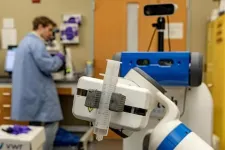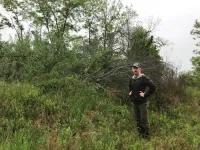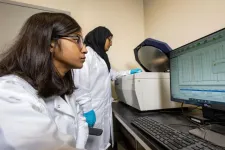(Press-News.org) The transition from water to land is one of the most significant events in the history of life on Earth. Now, a team of roboticists, palaeontologists and biologists is using robots to study how the ancestors of modern land animals transitioned from swimming to walking, about 390 million years ago.
Writing in the journal Science Robotics, the research team, led by the University of Cambridge, outline how ‘palaeo-inspired robotics’ could provide a valuable experimental approach to studying how the pectoral and pelvic fins of ancient fish evolved to support weight on land.
“Since fossil evidence is limited, we have an incomplete picture of how ancient life made the transition to land,” said lead author Dr Michael Ishida from Cambridge’s Department of Engineering. “Palaeontologists examine ancient fossils for clues about the structure of hip and pelvic joints, but there are limits to what we can learn from fossils alone. That’s where robots can come in, helping us fill gaps in the research, particularly when studying major shifts in how vertebrates moved.”
Ishida is a member of Cambridge’s Bio-Inspired Robotics Laboratory, led by Professor Fumiya Iida, the paper's senior author. The team is developing energy-efficient robots for a variety of applications, which take their inspiration from the efficient ways that animals and humans move.
With funding from the Human Frontier Science Program, the team is developing palaeo-inspired robots, in part by taking their inspiration from modern-day ‘walking fish’ such as mudskippers, and from fossils of extinct fish. “In the lab, we can’t make a living fish walk differently, and we certainly can’t get a fossil to move, so we’re using robots to simulate their anatomy and behaviour,” said Ishida.
The team is creating robotic analogues of ancient fish skeletons, complete with mechanical joints that mimic muscles and ligaments. Once complete, the team will perform experiments on these robots to determine how these ancient creatures might have moved.
“We want to know things like how much energy different walking patterns would have required, or which movements were most efficient,” said Ishida. “This data can help confirm or challenge existing theories about how these early animals evolved.”
One of the biggest challenges in this field is the lack of comprehensive fossil records. Many of the ancient species from this period in Earth’s history are known only from partial skeletons, making it difficult to reconstruct their full range of movement.
“In some cases, we’re just guessing how certain bones connected or functioned,” said Ishida. “That’s why robots are so useful—they help us confirm these guesses and provide new evidence to support or rebut them.”
While robots are commonly used to study movement in living animals, very few research groups are using them to study extinct species. “There are only a few groups doing this kind of work,” said Ishida. “But we think it’s a natural fit – robots can provide insights into ancient animals that we simply can’t get from fossils or modern species alone.”
The team hopes that their work will encourage other researchers to explore the potential of robotics to study the biomechanics of long-extinct animals. “We’re trying to close the loop between fossil evidence and real-world mechanics,” said Ishida. “Computer models are obviously incredibly important in this area of research, but since robots are interacting with the real world, they can help us test theories about how these creatures moved, and maybe even why they moved the way they did.”
The team is currently in the early stages of building their palaeo-robots, but they hope to have some results within the next year. The researchers say they hope their robot models will not only deepen understanding of evolutionary biology, but could also open up new avenues of collaboration between engineers and researchers in other fields.
The research was supported by the Human Frontier Science Program. Fumiya Iida is a Fellow of Corpus Christi College, Cambridge. Michael Ishida a Postdoctoral Research Associate at Gonville and Caius College, Cambridge.
END
‘Paleo-robots’ to help scientists understand how fish started to walk on land
2024-10-23
ELSE PRESS RELEASES FROM THIS DATE:
Study: Robotic automation, AI will speed up scientific progress in science laboratories
2024-10-23
Science laboratories across disciplines—chemistry, biochemistry and materials science—are on the verge of a sweeping transformation as robotic automation and AI lead to faster and more precise experiments that unlock breakthroughs in fields like health, energy and electronics, according to UNC-Chapel Hill researchers in the paper, “Transforming Science Labs into Automated Factories of Discovery,” published in Science Robotics, the most prestigious journal covering robotics research.
“Today, the development of new molecules, materials and chemical systems requires ...
Paleontologists discover Colorado ‘swamp dweller’ that lived alongside dinosaurs
2024-10-23
A team of paleontologists working near Rangely, Colorado, has uncovered a new (or, more accurately, very old) state resident—a fossil mammal about the size of a muskrat that may have scurried through swamps during the Age of Dinosaurs.
The researchers, led by the University of Colorado Boulder’s Jaelyn Eberle, published their findings Oct. 23 in the journal PLOS ONE.
Eberle and her colleagues named their discovery, which they identified from a piece of jawbone and three molar teeth, Heleocola piceanus. The animal lived in Colorado roughly 70 to 75 million years ago—a time when a vast inland sea covered ...
Repeated COVID vaccines enhance mucosal immunity against the virus
2024-10-23
Ghent, October 24, 2024 – During the COVID pandemic, many of us have received multiple mRNA vaccines. New work by researchers at the VIB-UGent Center for Inflammation Research, Ghent University, and University Hospital Ghent, among others, has found that such repeated vaccinations lead to the presence of mucosal antibodies, for example, inside the nose. Their work appears in Science Translational Medicine.
Protective booster shots
Part of the global response strategy against the COVID pandemic involves the administration of booster shots, or ‘vaccine updates’ to ensure ...
MD Anderson expands arts experience program to enhance healing and well-being for patients
2024-10-23
HOUSTON ― As part of its ongoing commitment to patient comfort and healing, The University of Texas MD Anderson Cancer Center today announced a new focus on art to support the revitalization and expansion of its clinical facilities. This initiative will include the creation of a multisensory healing environment in both public spaces and patient care areas that are designed to prevent disease, promote health and foster well-being.
This transformative project aims to enhance every aspect of the patient experience, reinforcing MD Anderson's dedication to comprehensive ...
Students at Historically Black Colleges and Universities (HBCUs) face barriers to medical school admission, study finds
2024-10-23
CHAPEL HILL, N.C. – There are 45.3 million African Americans living in the United States and they represent 13.6 percent of the U.S. population, according to the U.S. Census Bureau. But only 5.7 percent of physicians in the United States self-identify as Black, despite multiple efforts over many years to increase the number of Black doctors.
A new study led by Jasmine Weiss, MD, MHS, FAAP, assistant professor of pediatrics in the UNC School of Medicine, describes the barriers to medical school admission that students at Historically Black Colleges and ...
Symbiosis in ancient Corals
2024-10-23
Coral reefs rank among the most biodiverse habitats on Earth and are often referred to as the rainforests of the sea. Modern reef building corals evolved in the Triassic Period around 250 million years ago. They can live in symbiosis with tiny organisms, often algae, that can carry out photosynthesis. This photosymbiosis is particularly beneficial in nutrient-poor waters because it helps the corals to recycle scarce nutrients.
Geological evidence reveals that corals already existed in the Devonian period, over 385 million ...
Researchers receive grant to study invasive autumn olive
2024-10-23
Almost a ubiquitous presence in landscapes across Southwest Virginia, the invasive autumn olive thrives.
But it’s not supposed to be here.
Autumn olive is known for its nitrogen-fixing ability, allowing it to thrive in poor soils and outcompete native plants. The shrub’s berries are edible, rich in antioxidants such as lycopene, and have a tart-sweet flavor. While its berries are beneficial for wildlife, the plant's aggressive spread disrupts local ecosystems, reducing biodiversity.
With a one-year grant from the Powell River ...
New research shows urine tests may detect early diseases
2024-10-23
Early detection is critical when it comes to curing diseases like cancer, but not everyone has easy access to screening tools. For problems in the genitourinary (GU) tract (which includes the kidneys, prostate, and bladder), health providers usually use a combination of screening tools, including blood tests, imaging, and physical examinations. Scientists are now working on an even simpler tool for screening illnesses before they become a problem – urine analysis.
According to a new study from scientists at The University of Texas at Arlington, Chan-Zuckerberg Biohub, and Stanford University, ...
Antibiotics and antifungals may slightly affect Parkinson's risk, study finds
2024-10-23
A Rutgers Health study has found that people who took multiple courses of penicillin antibiotics had a modestly lower risk of developing Parkinson's disease, a surprising finding that researchers say highlights the complex relationship between bacteria in the digestive tract and brain health.
The study, published in Parkinsonism & Related Disorders, analyzed medical records from more than 93,000 people in the United Kingdom. Researchers found that those who received five or more courses of penicillin antibiotics in the five years before diagnosis had about a 15% lower risk of Parkinson's compared with those ...
Nixing narcolepsy nightmares
2024-10-23
Nightmares affect 30-40% of patients with narcolepsy, but are often overlooked
Treatment can transform patients’ sleep and their daytime mood in a matter of weeks
Study found overall reduction in nightmare severity and frequency in six patients
CHICAGO --- A new Northwestern Medicine study has demonstrated a new way to treat narcolepsy-related nightmares.
The scientists combined cognitive behavioral therapy (CBT) and lucid dreaming to help patients in a small clinical trial.
“We had them imagine what they’d like to dream instead of their nightmare, almost like they’re writing a movie script,” said corresponding author ...





